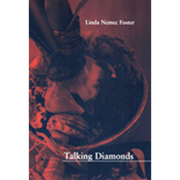Review of Linda Nemec Foster’s Talking Diamonds
Talking Diamonds
Linda Nemec Foster
New Issues, 2009
Review by Jeanne Lesinski
Featuring a sprouting amaryllis bulb, a handful of seashells, and a holy card of the Virgin and Child—all bathed in red—the cover of Talking Diamonds sets the tone for the many somber poems in this, Foster’s ninth collection. Other books by Foster, who was named the first poet laureate of Grand Rapids in 2003, include Amber Necklace from Gdansk and Ten Songs from Bulgaria.
The emotional intensity of the first 20 pages of Talking Diamonds propels the reader relentlessly forward, through poems of parental loss (“Sleeping in a Room Filled with the Past” and “I Enter My Mother’s Dementia”) and parental anxiety, then downward with the falling rain and disintegrating towers to the “Total Eclipse.” I admit to finding myself in circumstances eerily similar to those portrayed in some of these poems, but that is not the only reason they haunt me like the bassoon solo in Stravinsky’s Rite of Spring. Foster crafts her poems well, juxtaposing images to great effect in “Sleeping in a Room” in which a collection of shells meshes with the physical and mental souvenirs that represent “the past lives you’ve survived and left behind.” She does the same with voices in “I Enter My Mother’s Dementia.” By alternating between the protagonist’s thoughts and artifacts of the mother’s past life and painful evidences of a diminished present, she draws the reader into the midst of this experience. Each poem grows steadily heavier as it progresses, ending in a manner very true to life.
In a handful of poems Foster explores spirituality, sometimes humorously as in “A Sign from God” or “The Tao of Junk Mail,” but at other times downplaying the dramatic for the quotidian, as in “The Third Secret of Fatima.” The numinous appears unexpectedly for the protagonist of “Vision,” sunbathing on a Hawaiian beach. It takes the form of a man bearing a tattoo of the Virgin and Child, like a holy card, on his front and back. Suddenly, the incongruousness of this vision overwhelms the protagonist:
And you tell yourself this isn’t a miracle,
only a tattoo; this isn’t anything
extraordinary, only your life,
the crowded beach, the husband and son
waving impatiently for you to just
come on, come on, dive in.
And yet. And yet, the emotional truth rings out in this as in other poems in the collection. Where else should the miraculous happen but in everyday lives, in moments when humans are graced with the extraordinary through enhanced perception. Foster seems to invite readers “come on, come on, dive in,” into Talking Diamonds and into life.
Originally Published by 360 Main Street, click here to view article.

